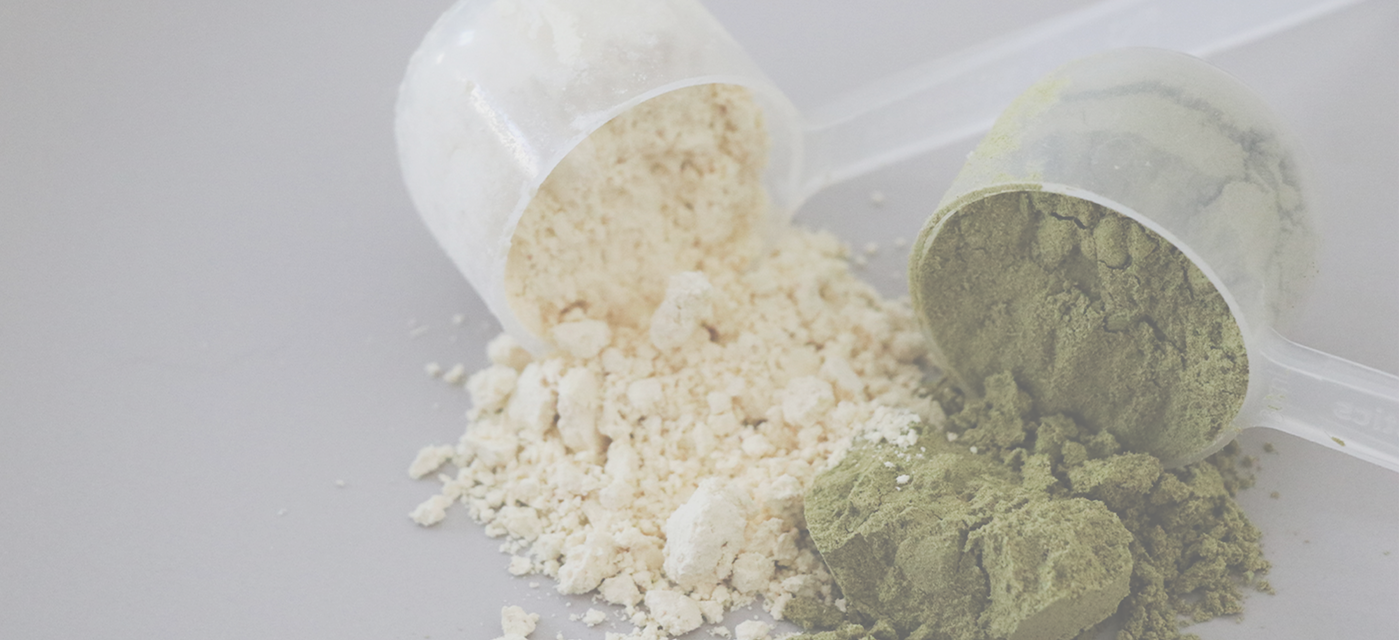
Hemp Protein vs Whey Protein: May the Best Powder Win
Protein powders boost your daily protein intake and offer a level of convenience and portability that's simply hard to top.
No matter your individual goals, high-quality protein supplementation can help you manage your weight and body composition, as well as support muscle growth, improve exercise recovery, and boost your immune system.
Protein is often the topic of nutrition debates. When it comes to protein supplementation, which protein source reigns supreme? Well, there are many factors to consider.
A competitive powerlifter with a “perform at all costs” mentality likely has vastly different nutrition goals than the everyday gym-goer or running enthusiast. Those who prioritize clean eating might prefer hemp over whey. We are not against whey protein; however, we are obviously big hemp advocates.
When weighing the benefits of hemp vs whey protein powder, there are a few things you should know to make the best decision for your own health, longevity, and performance. We choose to sell hemp protein products exclusively, and there are reasons for that. And we’ll dive into those. Let’s get the scoop ….
Hemp vs Whey: A Look at Protein Ratios and Processing
Protein ratio is the percentage of food that is made up of the actual macronutrient we call protein. Protein powders range from 40%-99% protein, with the remaining percentage being made up of fats, fiber, and carbohydrates.
Whey protein isolate typically contains a very high percentage of protein; however, it often requires heavier processing involving the use of chemicals like hexane or different acids, which can result in stripping any other nutritional value they once had.
On the other hand, 40-50 percent of protein powders are much closer to their whole-food sources. This may sound ideal to you at first, but the lower concentrations are much harder to use. From a usability standpoint, Hemplete is unmatched. It mixes so well that many people drink our Chocolate Protein Powder with nothing more than water or plant-based milk. From our experience, it mixes—and tastes—better than whey protein.
If you buy a 50 or 60 percent plant protein you’ll find it impossible to mix well in liquids, and even a single serving will tend to overpower your smoothies and other recipes, sinking to the bottom and leaving a gritty texture in your mouth. You’ll definitely need a blender, so say goodbye to convenience and portability. We use 75% organic hemp protein in our cold processed powders. The average hemp protein powder contains 13.5 grams of protein per 30-gram serving. Hemplete contains over 19 grams!
Hemp Protein Benefits: How It’s Made and What Sets It Apart

Hemp protein is a complete plant-based protein with a strong amino acid profile, much like that of an egg. In fact, it contains all nine essential amino acids that the human body requires for survival.
Hemp protein is made up of milled hemp seeds. The seeds are cold-pressed and once the oil has been removed, a hemp cake remains. This is milled into a fine powder. The protein concentration is determined by the size of the screen used to sift out the milled hemp cake. This process requires no additives or chemical processing agents. The same cannot be said for most high-protein whey products.
✅ Clean. Our Unflavored Protein features one single organic ingredient: hemp. How’s that for clean? Some whey proteins include over 25 ingredients, including artificial sweeteners and flavors. No chemical processing, no GMOs.
✅ Protein-rich. 3 tablespoons of Hemplete hemp protein powder has 14g of protein and 90 calories. Many hemp protein powders consist of non-organic hemp protein with a lower concentration of protein. Hemplete organic protein powder is made up of 75% protein.
✅ Packed with 20 amino acids, including all nine of the essentials.
✅ Superior to all other vegetarian proteins. Pea and rice proteins lack certain essential amino acids. And many people have soy allergies. Additionally, superfood hemp is a clean plant-based protein that requires no pesticides or herbicides.
✅ Sugar-free. Hemplete hemp protein powder and bars contain zero grams of sugar. We sweeten our hemp powder with monk fruit extract.
✅ Sustainable. Hemp absorbs pollutants from the atmosphere and unlike soy and corn, it restores nutrients to soil damaged from unnatural farming practices. Hemp is also grown naturally without pesticides. And it’s short growth cycle makes it even more sustainable.
✅ Easily Digestible. 91-98% of the protein in hemp is digestible. Plus, Hemp contains the proteins albumin and edestin, which aid in digestion.
✅ Loaded with Fiber. Hemplete bars are packed with 11 grams of fiber; our powders have 2 grams per serving.
✅ Natural source of vitamin E, phosphorus, magnesium, potassium, sodium, iron, calcium, and zinc.
✅ Full of omega 3 and 6 fatty acids. Hemp is loaded with fatty acids that fight inflammation and keep your heart healthy.
✅ Delicious. Earthy? Think again. Unflavored Hemplete hemp protein powder is, well, flavorless, our chocolate-flavored variety is delicious and enhances the flavor of any smoothie or bowl.
🚫 Less protein than whey (per gram)
🚫 Won’t get you high (disappointing to some)
🚫 Lower in lysine and leucine (very high in blood-pumping arginine and brain-boosting tyrosine)
Whey Protein Benefits: How It’s Made and What Sets It Apart

In a simple apples-to-apples comparison, whey protein wins. In other words, it has more protein per gram, on average, than any plant-based source. While hemp is a by-product of the hemp seed oil production process, whey protein is a by-product of the cheese-making process. Whey protein consists of a mixture of proteins isolated from the liquid portion of milk that separates during cheese production (the fatty parts solidify).
The higher the protein percentage, the higher the likelihood that the whey undergoes multiple stages of processing. Chemical agents are often used in the isolation process and manufacturers are not required to disclose information regarding their use. Amino acid spiking is also common, as companies add in low-quality filler proteins for the final food analysis.
Whey is the choice of most professional bodybuilders, Crossfit athletes, and powerlifters. Why? Whey protein supplementation is believed to be one of the best ways to help improve muscle protein synthesis and aid in the growth of lean muscle.
✅ Features all 20 amino acids, including all nine essentials.
✅ Fast-absorbing protein source. Whey absorbs quickly, making it a good option for a post-workout smoothie or shake.
🚫 Added sugar. Most whey protein powder contains sugar or artificial sweetener.
🚫 Unsustainable. 30% of biodiversity loss is directly related to livestock production, including dairy farming.
🚫 Not easily digestible. Whey usually contains traces of lactose and is notorious for causing digestive issues. Listen to your body to determine whether you should try a different protein source.
🚫 Low in fiber. Whey protein is not a good source of fiber.
✅ Natural source of potassium, sodium, and calcium.
🚫 Not a great source of omega 3 and 6 fatty acids. If you go with whey, consider grass-fed varieties, as they tend to contain more healthy fats.
✅ Delicious. Some whey is tasty. Some taste like metallic cottage cheese. Just be sure to check the ingredients to make sure no artificial flavors are added.
🚫 May contain heavy metals. Trace amounts of heavy metals are sometimes found in whey protein.
🚫 Can cause bloating and gas. This is a common side effect and a big reason why people make the switch to plant-based protein sources.
Who Wins the Hemp vs Whey Debate?
So who wins in the battle between the complete proteins? Well, we do have some serious concerns about whey protein, ranging from digestion issues to veiled production processes. When it comes to building muscle, a recent study found that total daily intake is the key factor in muscle growth. So, as long as you are getting adequate protein (.72 to .90 grams per pound of body weight), you should be able to build lean muscle mass—no matter the source. But don’t take it from us. Check out these vegan bodybuilders. If you're not lifting weights or doing heavy resistance training on a regular basis, you won’t need as much protein to repair cells and maintain muscle mass.
For long term use, we believe hemp protein wins. If you are training for a bodybuilding competition or have a powerlifting meet coming up, you may lean towards whey. But listen to your body. If you are more focused on living a healthy lifestyle, consider hemp protein. And consider that hemp farming is renewable, sustainable, and environmentally friendly. If whey doesn’t upset your stomach, look for grass-fed organic options.
WINNER: Hemp

The Case for Hemp in a World of Whey
Let's elaborate a bit. Due to a lack of regulation, you can’t be too sure about what’s in the average whey powder, or whether or not it was sourced ethically. We use organic hemp protein in all of our products. If you like to know what you’re putting in your body, just skim our ingredients labels, or contact us at support@hemplete.com to learn about the origins of every ingredient. We use zero chemicals during the making of our protein powder while maintaining a much higher ratio of protein than other products on the market.
Additionally, all of our organic hemp is cold processed and heavy-metal tested. This means our protein still maintains the raw, whole-food qualities of hemp protein while also offering much more protein per serving.
And last, true to our mission, we never add flavorings, sugars, flow agents or other weird additives to our powders. We believe that if you can’t make something at home in the kitchen, you shouldn’t package it to sell as a food, and that’s why all of our recipes started in our own kitchen, tested on friends and family before we ever sold them to the public. All of this is in stark contrast to much of the protein supplement market.
In the end, only hemp is a nutritionally complete superfood all on its own. Give it a go and try one of our sample packs of hemp protein bars or purchase one of our organic protein powders.



Leave a comment
This site is protected by hCaptcha and the hCaptcha Privacy Policy and Terms of Service apply.